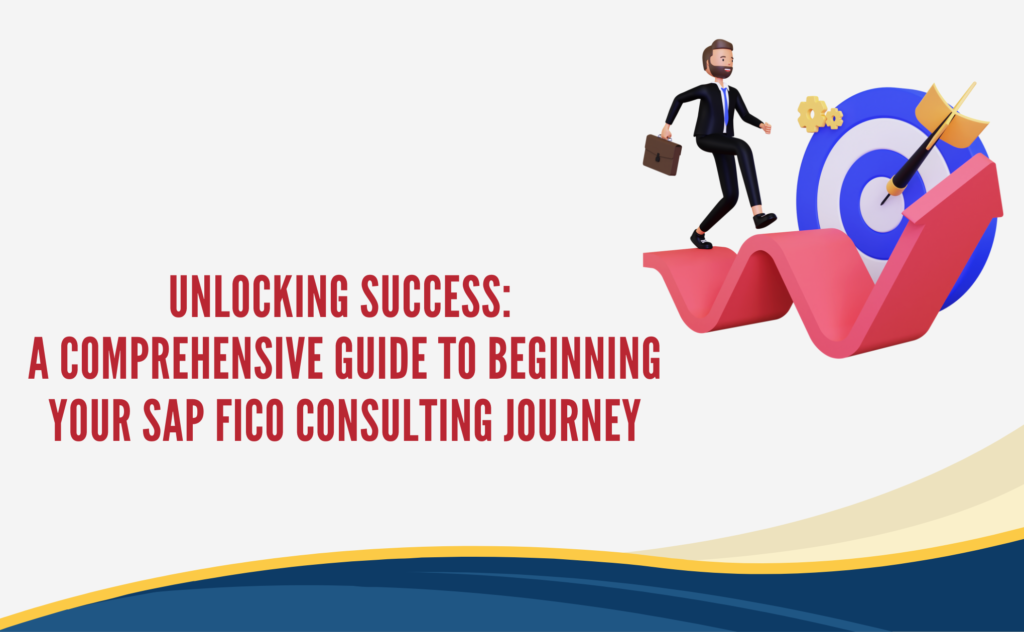Starting Your Career as an SAP FICO Consultant: A Comprehensive Guide

If you’re considering a career in SAP (Systems, Applications, and Products) as an FICO consultant, you’re on the right track to becoming a vital part of modern business operations. SAP FICO (Finance and Controlling) is one of the most sought-after modules in the SAP ecosystem, and understanding its intricacies is key to a successful career in this field. In this blog post, we’ll delve into the SAP FI module, the SAP Controlling module, and the sub-components of SAP CO, giving you a solid foundation to kickstart your career journey.
SAP FI Module and Its Application
SAP FI Overview:
SAP FI, or Financial Accounting, is a fundamental module that manages financial transactions within an organization. It plays a pivotal role in financial reporting, tracking financial data, and ensuring compliance with legal requirements. Here’s a closer look at its key components and application:
- General Ledger Accounting (G/L): This is the core of SAP FI. It records all financial transactions, providing a complete picture of an organization’s financial status. As an FICO consultant, you’ll configure G/L accounts, manage journal entries, and oversee the chart of accounts.
- Accounts Payable (AP): AP manages all outgoing payments and vendor invoices. You’ll be responsible for vendor master data, invoice verification, and payment processing.
- Accounts Receivable (AR): AR handles incoming payments, customer invoices, and receivables management. Your role includes managing customer master data, dunning processes, and credit control.
- Asset Accounting (AA): AA deals with an organization’s assets, including acquisition, depreciation, and disposal. Your responsibilities will include asset master data management and depreciation calculations.
- Bank Accounting: Bank accounting ensures seamless integration of your financial transactions with your bank. You’ll be responsible for bank master data and electronic bank statement processing.
SAP FI Application:
The SAP FI module plays a critical role in financial planning, analysis, and reporting. It aids businesses in making informed decisions, streamlining financial processes, and ensuring compliance with financial regulations. As an SAP FICO consultant, you’ll work closely with finance teams to optimize financial operations and reporting.
SAP Controlling Module and Its Application
SAP Controlling Overview:
The SAP Controlling (CO) module complements SAP FI by focusing on the internal accounting processes necessary for an organization’s day-to-day operations and decision-making. It provides detailed insights into an organization’s cost and performance. Here are the primary components and their applications:
- Cost Element Accounting: This component helps track and categorize costs within an organization, making it easier to allocate expenses to specific cost centers and profit centers.
- Cost Center Accounting: Cost centers are crucial for tracking costs related to specific departments or areas within an organization. You’ll be responsible for creating cost centers and monitoring their expenses.
- Internal Orders: Internal orders allow you to monitor costs related to specific projects or initiatives. Your role includes setting up internal orders and tracking their budgets.
- Product Costing: Product costing helps determine the cost of manufacturing a product or providing a service. It’s essential for pricing strategies and profit analysis.
- Profitability Analysis (CO-PA): CO-PA allows you to analyze the profitability of products, customers, and business segments. It’s crucial for making strategic decisions.
SAP CO Application:
SAP Controlling empowers organizations to optimize their internal processes, control costs, and enhance decision-making. As an SAP FICO consultant, you’ll collaborate with various departments to ensure efficient cost management, budgeting, and profitability analysis.
Sub-Components of SAP CO Module
The SAP CO module comprises sub-components that further refine its functionalities and applications:
- Overhead Cost Controlling (CO-OM): This sub-component focuses on managing overhead costs, making it easier to allocate indirect expenses to cost centers and projects.
- Profit Center Accounting (EC-PCA): Profit centers enable businesses to track the profitability of specific areas or units. EC-PCA is crucial for assessing the financial performance of different parts of an organization.
- Product Cost Planning (CO-PC): CO-PC is essential for calculating the cost of manufacturing products. It includes functionalities like cost estimates and cost object controlling.
- Material Ledger (CO-ML): Material Ledger enhances the accuracy of material valuation, providing real-time insights into inventory costs and currency valuation.
Starting your career as an SAP FICO consultant offers exciting opportunities to work with cutting-edge technology and make a significant impact on an organization’s financial success. Understanding the SAP FI module, SAP Controlling module, and their sub-components is the first step towards mastering this field and becoming a valued asset to businesses worldwide.

Leave a Reply